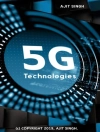This book presents the latest research on applications of artificial intelligence and the Internet of Things in renewable energy systems. Advanced renewable energy systems must necessarily involve the latest technology like artificial intelligence and Internet of Things to develop low cost, smart and efficient solutions. Intelligence allows the system to optimize the power, thereby making it a power efficient system; whereas, Internet of Things makes the system independent of wire and flexibility in operation. As a result, intelligent and IOT paradigms are finding increasing applications in the study of renewable energy systems. This book presents advanced applications of artificial intelligence and the internet of things in renewable energy systems development. It covers such topics as solar energy systems, electric vehicles etc. In all these areas applications of artificial intelligence methods such as artificial neural networks, genetic algorithms, fuzzy logic and a combination of the above, called hybrid systems, are included. The book is intended for a wide audience ranging from the undergraduate level up to the research academic and industrial communities engaged in the study and performance prediction of renewable energy systems.
Table of Content
A Day Ahead Power Output Forecasting of three PV Systems using Regression, Machine Learning and Deep Learning Techniques.- Internet of Things and Internet of Drones in the Renewable Energy Infrastructure Towards Energy Optimization.- Reinforcement Learning Algorithm to Reduce Energy Consumption in Electric Vehicles.- Spotted Hyena Optimization (SHO) Algorithm based Novel Control Approach for Buck DC-DC Converter Fed PMBLDC Motor.- Simulation and Performance Analysis of Standalone Photovoltaic System with Boost Converter Under Irradiation and Temperature.- Analysis of Variation in Locational Marginal Pricing under Influence of Stochastic Wind Generation.- Optimal Integration of Plug-In Electric Vehicles Within a Distribution Network Using Genetic Algorithm.- Frequency Control of 5k W Self-Excited Induction Generator Using Gravitational Search Algorithm and Genetic Algorithm.- Cloud Based Real-time Vibration and Temperature Monitoring System for Wind Turbine.- Smart Solar-Powered Smart Agricultural Monitoring System Using Internet of Things Devices.
About the author
Rabindra Nath Shaw is a Senior Member of IEEE (USA), currently holding the post of Director, International Relations, Galgotias University India. He is an alumnus of the applied physics department, University of Calcutta, India. . He has more than eleven years teaching experience in leading institutes like Motilal Nehru National Institute of Technology Allahabad, India, Jadavpur University and others in UG and PG level. He has successfully organised more than fifteen International conferences as Conference Chair, Publication Chair and Editor. He has published more than fifty Scopus/ Wo S/ ISI indexed research papers in International Journals and conference Proceedings. He is the editor of several Springer and Elsevier books. His primary area of research is optimization algorithms and machine learning techniques for power systems, Io T Application, Renewable Energy, and power Electronics converters. He also worked as University Examination Coordinator, University MOOC’s Coordinator, University Conference Coordinator and Faculty- In Charge, Centre of Excellence for Power Engineering and Clean Energy Integration.
Nishad Mendis is a Senior Engineer working in DNV. GL’s Energy Advisory group in Melbourne, Australia. Before joining DNV GL, Nishad worked for Eltek as a Solutions Engineer working on the design of the implementation of energy storage-based applications, Alstom Grid as a Design and Commissioning Engineer for HV substations and Noratel as a transformer Design Engineer. Nishad has over 15 years of professional experience, including a Ph.D. from the University of Wollongong, Australia, and a Bachelor of Electrical Engineering with honors from the University of Moratuwa, Sri Lanka.. Nishad also currently holds IEEE Senior membership and serves as Executive Board Member for the IEEE Industrial Application Society. Also, he is serving as an Honorary Fellow for the School of Electrical Engineering for Deakin University, Australia. He is experienced in engineering, project management, sales and tendering, research and development areas.
Saad Mekhilef is IET Fellow and IEEE Senior Member. He is Associate Editor of IEEE Transaction on Power Electronics and Journal of Power Electronics. He is Professor at the Department of Electrical Engineering, University of Malaya, since June 1999. He is currently Dean of the Faculty of Engineering and Director of Power Electronics and Renewable Energy Research Laboratory, PEARL. He is the author and the co-author of more than 400 publications in international journals and proceedings (253 ISI journal papers) and five books with more than 17000 citations and 64 H-index; 116 Ph.D. and master students have graduated under his supervision. He has six patents. He was frequently invited to give keynote lectures at international conferences. Prof. Saad listed by Thomson Reuters (Clarivate Analytics) as one of the Highly Cited (Hi Ci) engineering researchers in the world and included in the Thomson Reuters’ The World’s Most Influential Scientific Minds: 2018. He is actively involved in industrial consultancy for major corporations in the power electronics projects. His research interests include power conversion techniques, control of power converters, renewable energy and energy efficiency.
Ankush Ghosh is Associate Professor in the School of Engineering and Applied Sciences, The Neotia University, India and Visiting Faculty at Jadavpur University, Kolkata, India. He has more than 15 years of experience in Teaching, research as well as industry. He has outstanding research experiences and published more than 60 research papers in International Journal and Conferences. He was a research fellow of the Advanced Technology Cell- DRDO, Govt. of India. He was awarded National Scholarship by HRD, Govt. of India. He received his Ph.D. (Engg.) Degree from Jadavpur University, Kolkata, India in 2010. His UG and PG teaching assignments include Microprocessor and microcontroller, AI, IOT, Embedded and real time systems etc. He has delivered Invited lecture in a number of international seminars/conferences, refreshers courses, and FDPs. He has guided a large number of M.Tech and Ph.D. students. He is Editorial Board Member of seven International Journals.












